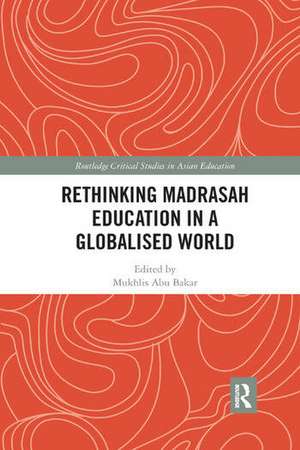Rethinking Madrasah Education in a Globalised World: Routledge Critical Studies in Asian Education
Editat de Mukhlis Abu Bakaren Limba Engleză Paperback – 28 feb 2019
| Toate formatele și edițiile | Preț | Express |
|---|---|---|
| Paperback (1) | 406.37 lei 6-8 săpt. | |
| Taylor & Francis – 28 feb 2019 | 406.37 lei 6-8 săpt. | |
| Hardback (1) | 1000.27 lei 6-8 săpt. | |
| Taylor & Francis – 7 dec 2017 | 1000.27 lei 6-8 săpt. |
Din seria Routledge Critical Studies in Asian Education
-
 Preț: 364.17 lei
Preț: 364.17 lei -
 Preț: 303.49 lei
Preț: 303.49 lei -
 Preț: 341.62 lei
Preț: 341.62 lei -
 Preț: 303.87 lei
Preț: 303.87 lei -
 Preț: 442.50 lei
Preț: 442.50 lei - 18%
 Preț: 1057.09 lei
Preț: 1057.09 lei - 18%
 Preț: 1004.86 lei
Preț: 1004.86 lei - 12%
 Preț: 292.72 lei
Preț: 292.72 lei -
 Preț: 442.50 lei
Preț: 442.50 lei - 12%
 Preț: 292.99 lei
Preț: 292.99 lei - 18%
 Preț: 997.11 lei
Preț: 997.11 lei -
 Preț: 422.59 lei
Preț: 422.59 lei -
 Preț: 402.66 lei
Preț: 402.66 lei - 14%
 Preț: 292.99 lei
Preț: 292.99 lei - 14%
 Preț: 292.72 lei
Preț: 292.72 lei - 12%
 Preț: 292.08 lei
Preț: 292.08 lei - 18%
 Preț: 1000.27 lei
Preț: 1000.27 lei -
 Preț: 477.02 lei
Preț: 477.02 lei - 18%
 Preț: 1054.71 lei
Preț: 1054.71 lei - 18%
 Preț: 1000.27 lei
Preț: 1000.27 lei -
 Preț: 439.41 lei
Preț: 439.41 lei -
 Preț: 442.50 lei
Preț: 442.50 lei -
 Preț: 442.50 lei
Preț: 442.50 lei - 18%
 Preț: 1007.12 lei
Preț: 1007.12 lei - 13%
 Preț: 290.00 lei
Preț: 290.00 lei - 18%
 Preț: 1000.27 lei
Preț: 1000.27 lei -
 Preț: 399.79 lei
Preț: 399.79 lei - 18%
 Preț: 1000.27 lei
Preț: 1000.27 lei -
 Preț: 473.71 lei
Preț: 473.71 lei
Preț: 406.37 lei
Nou
Puncte Express: 610
Preț estimativ în valută:
77.76€ • 81.19$ • 64.36£
77.76€ • 81.19$ • 64.36£
Carte tipărită la comandă
Livrare economică 05-19 aprilie
Preluare comenzi: 021 569.72.76
Specificații
ISBN-13: 9780367201623
ISBN-10: 0367201623
Pagini: 276
Ilustrații: 8
Dimensiuni: 156 x 234 x 15 mm
Greutate: 0.54 kg
Ediția:1
Editura: Taylor & Francis
Colecția Routledge
Seria Routledge Critical Studies in Asian Education
Locul publicării:Oxford, United Kingdom
ISBN-10: 0367201623
Pagini: 276
Ilustrații: 8
Dimensiuni: 156 x 234 x 15 mm
Greutate: 0.54 kg
Ediția:1
Editura: Taylor & Francis
Colecția Routledge
Seria Routledge Critical Studies in Asian Education
Locul publicării:Oxford, United Kingdom
Public țintă
Postgraduate and ProfessionalCuprins
Acknowledgements
Contributors
Reviewers
Introduction (Mukhlis Abu Bakar)
Part I: SOCIAL, POLITICAL AND CULTURAL CONTEXTS
1. Challenges to madrasah education in contemporary Muslim societies (Noor Aisha Abdul Rahman)
2. State, community and madrasah reform in India (Arshad Alam)
3. Resistance to reform? The Pakistani madaris in historical and political perspective (Christopher Candland)
4. Modernising madrasah education: The Singapore ‘national’ and the global (S. Gopinathan)
5. Muslim schools in Britain: Between mobilisation and incorporation (Nasar Meer and Damian Breen)
Part II: CURRICULUM AND PEDAGOGY
6. Reconceptualising madrasah education: Towards a radicalised imaginary (Yusef Waghid)
7. Developing Shakhṣiyah Islāmīyah: Personalised character education for British Muslims (Farah Ahmed and Tahreem Sabir)
8. Integrating an Islamic Studies curriculum in both religious and secular classrooms in an American school (Habeeb Quadri)
9. Integrated and holistic Islamic education curriculum: The Singapore madrasah model (Farah Mahamood Aljunied and Albakri Ahmad)
10. The Islamic Studies education curriculum of Malaysian national schools: A study of its philosophy and content (Rosnani Hashim)
Part III: ISSUES IN EDUCATIONAL REFORMS
11. Policy borrowing in madrasah education: The Singapore experience (Charlene Tan and Diwi Binti Abbas)
12. Curriculum reform in the Indonesian madrasah: The position of madrasah in the post-independence’s education system (Raihani)
13. Development of Madrasah Education in Bosnia and Herzegovina (Dina Sijamhodžić-Nadarević)
14. Reform in madrasah education: The South Africa experience (Yusef Waghid)
15. Madrasah education and Muslim communities in Hong Kong (Wai-Yip Ho)
Contributors
Reviewers
Introduction (Mukhlis Abu Bakar)
Part I: SOCIAL, POLITICAL AND CULTURAL CONTEXTS
1. Challenges to madrasah education in contemporary Muslim societies (Noor Aisha Abdul Rahman)
2. State, community and madrasah reform in India (Arshad Alam)
3. Resistance to reform? The Pakistani madaris in historical and political perspective (Christopher Candland)
4. Modernising madrasah education: The Singapore ‘national’ and the global (S. Gopinathan)
5. Muslim schools in Britain: Between mobilisation and incorporation (Nasar Meer and Damian Breen)
Part II: CURRICULUM AND PEDAGOGY
6. Reconceptualising madrasah education: Towards a radicalised imaginary (Yusef Waghid)
7. Developing Shakhṣiyah Islāmīyah: Personalised character education for British Muslims (Farah Ahmed and Tahreem Sabir)
8. Integrating an Islamic Studies curriculum in both religious and secular classrooms in an American school (Habeeb Quadri)
9. Integrated and holistic Islamic education curriculum: The Singapore madrasah model (Farah Mahamood Aljunied and Albakri Ahmad)
10. The Islamic Studies education curriculum of Malaysian national schools: A study of its philosophy and content (Rosnani Hashim)
Part III: ISSUES IN EDUCATIONAL REFORMS
11. Policy borrowing in madrasah education: The Singapore experience (Charlene Tan and Diwi Binti Abbas)
12. Curriculum reform in the Indonesian madrasah: The position of madrasah in the post-independence’s education system (Raihani)
13. Development of Madrasah Education in Bosnia and Herzegovina (Dina Sijamhodžić-Nadarević)
14. Reform in madrasah education: The South Africa experience (Yusef Waghid)
15. Madrasah education and Muslim communities in Hong Kong (Wai-Yip Ho)
Notă biografică
Mukhlis Abu Bakar is Associate Professor at the Asian Languages and Cultures Academic Group, National Institute of Education, Nanyang Technological University, Singapore.
Descriere
This book explores the problems and challenges that come with new knowledge, biotechnological advancement and societal transformation facing Muslims, and to identify the processes towards reformation that impinge on the philosophies (both Western and Islamic), religious traditions and spirituality, learning principles, curriculum, and pedagogy.
